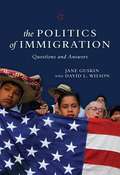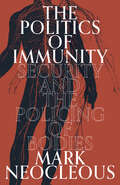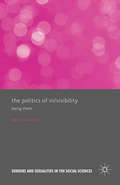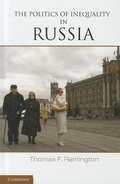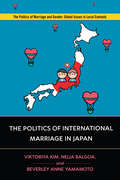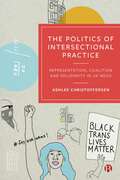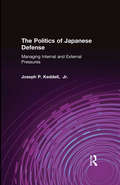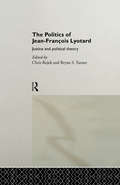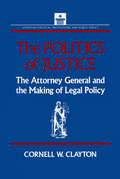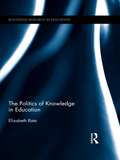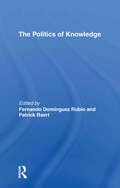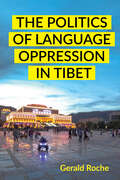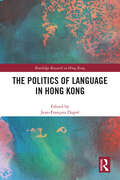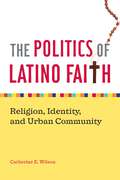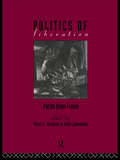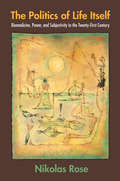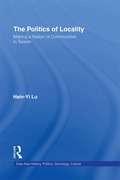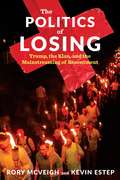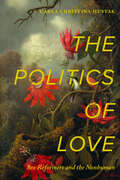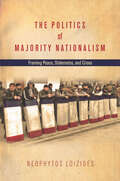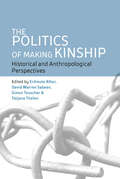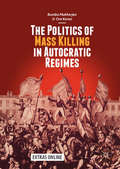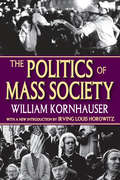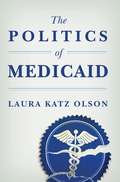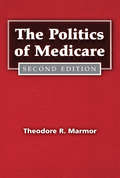- Table View
- List View
The Politics of Immigration: Questions and Answers
by Jane Guskin David L. WilsonBacked with a wide range of cited sources, The Politics of Immigration tackles questions and concerns about immigration with compelling arguments and hard facts, laid out in straightforward language and an accessible question-and-answer format. For immigrants and supporters, the book is an effective tool to confront common myths and misinformation. For teachers, it provides a useful framework on the current debate, and ample opportunities for students to reach out and explore the intersecting issues. Those who believe immigrants steal jobs from citizens, drive down wages, strain public services, and threaten our culture will find such assumptions challenged here, while people who are undecided about immigration will find the solid data and clear reasoning they need to develop an informed opinion.
The Politics of Immunity: Security and the Policing of Bodies
by Mark NeocleousThe violence and destruction hiding behind the obsession with immunityOur contemporary political condition is obsessed with immunity. The immunity of bodies and the body politic; personal immunity and herd immunity; how to immunize the social system against breakdown. The obsession intensifies with every new crisis and the mobilization of yet more powers of war and police, from quarantine to border closures and from vaccination certificates to immunological surveillance.Engaging four key concepts with enormous cultural weight – Cell, Self, System and Sovereignty – Politics of Immunity moves from philosophical biology to intellectual history and from critical theory to psychoanalysis to expose the politics underpinning the way immunity is imagined. At the heart of this imagination is the way security has come to dominate the whole realm of human experience. From biological cell to political subject, and from physiological system to the social body, immunity folds into security, just as security folds into immunity. The book thus opens into a critique of the violence of security and spells out immunity&’s tendency towards self-destruction and death: immunity, like security, can turn its aggression inwards, into the autoimmune disorder.Wide-ranging and polemical, Politics of Immunity lays down a major challenge to the ways in which the immunity of the self and the social are imagined.
The Politics of In/Visibility: Being There (Genders and Sexualities in the Social Sciences)
by Kath WoodwardVisibility matters in contemporary societies; online, in the media and in the public eye. But who is seen and how? Are women still seen through a male gaze? This book explores the politics of looking and being looked at, and the relationship between actual and virtual worlds, for example in sport, art and cinema.
The Politics of Inequality in Russia
by Thomas F. RemingtonThis book investigates the relationship between the character of political regimes in Russia's subnational regions and the structure of earnings and income. Based on extensive data from Russian official sources and surveys conducted by the World Bank, the book shows that income inequality is higher in more pluralistic regions. It argues that the relationship between firms and government differs between more democratic and more authoritarian regional regimes. In more democratic regions, business firms and government have more cooperative relations, restraining the power of government over business and encouraging business to invest more, pay more and report more of their wages. Average wages are higher in more democratic regions and poverty is lower, but wage and income inequality are also higher. The book argues that the rising inequality in postcommunist Russia reflects the inability of a weak state to carry out a redistributive social policy.
The Politics of International Marriage in Japan (Politics of Marriage and Gender: Global Issues in Local Contexts)
by Viktoriya Kim Nelia G. Balgoa Beverley Anne YamamotoThis book provides an in-depth exploration and analysis of marriages between Japanese nationals and migrants from three broad ethnic/cultural groups - spouses from the former Soviet Union countries, the Philippines, and Western countries. It reveals how the marriage migrants navigate the intricacies and trajectories of their marriages with Japanese people while living in Japan. Seen from the lens of ‘gendered geographies of power’, the book explores how state-level politics and policies towards marriage, migration, and gender affect the personal power politics in operation within the relationships of these international couples. Overall, the book discusses how ethnic identity intersects with gender in the negotiation of spaces and power relations between and amongst couples; and the role states and structural inequalities play in these processes, resulting in a reconfiguration of our notions of what international marriages are and how powerful gender and the state are in understanding the power relations in these unions.
The Politics of Intersectional Practice: Representation, Coalition and Solidarity in UK NGOs
by Ashlee ChristoffersenIt is increasingly recognized that, to achieve social justice, policies and organizations need to apply an intersectional approach, rather than addressing inequalities separately. However, intersectionality is a challenging theory to apply, as policy makers and practitioners often navigate the confines of divided policy areas. This book examines the use of intersectionality in UK policy and practice, with a specific focus on NGOs, outlining five distinct interpretations of intersectional practice and their implications. Drawing from extensive fieldwork with a diverse range of equality organizations, this book offers invaluable insights into how policy and practice can be organized in more (and less) intersectional ways.
The Politics of Japanese Defense: Managing Internal and External Pressures
by Joseph P. KeddellThe ruling Liberal Democratic Party of Japan uses incremental changes to manage conflicting pressures over defence.This work focuses on the establishment of defence policy constraints through 1992. It discusses the various implications of using defence policy as a means of conflict management.
The Politics of Jean-Francois Lyotard: Justice and Political Theory
by Bryan S. Turner Chris RojekJean-Francois Lyotard is still considered to be the father of postmodernism. An international range of contributors in the field of cultural and philosophical studies, including Barry Smart, John O' Neill and Victor J. Seidler consider Lyotard's writings on justice and politics of difference, feminism, youth and Judaism.
The Politics of Justice: Attorney General and the Making of Government Legal Policy
by Cornell W. ClaytonFirst Published in 2015. Routledge is an imprint of Taylor & Francis, an Informa company.
The Politics of Knowledge in Education (Routledge Research in Education)
by Elizabeth RataThis book explores the decline of the teaching of epistemic, conceptual knowledge in schools, its replacement with everyday social knowledge, and its relation to changes in the division of labor within the global economy. It argues that the emphasis on social knowledge in postmodern and social constructionist pedagogy compounds the problem, and examines the consequences of these changes for educational opportunity and democracy itself.
The Politics of Knowledge.
by Patrick Baert Fernando Domínguez RubioSocial scientists often refer to contemporary advanced societies as ‘knowledge societies’, which indicates the extent to which ‘science’, ‘knowledge’ and ‘knowledge production’ have become fundamental phenomena in Western societies and central concerns for the social sciences. This book aims to investigate the political dimension of this production and validation of knowledge. In studying the relationship between knowledge and politics, this book provides a novel perspective on current debates about ‘knowledge societies’, and offers an interdisciplinary agenda for future research. It addresses four fundamental aspects of the relation between knowledge and politics: • the ways in which the nature of the knowledge we produce affects the nature of political activity • how the production of knowledge calls into question fundamental political categories • how the production of knowledge is governed and managed • how the new technologies of knowledge produce new forms of political action. This book will be of interest to students of sociology, political science, cultural studies and science and technology studies.
The Politics of Language Oppression in Tibet
by Gerald RocheIn The Politics of Language Oppression in Tibet, Gerald Roche sheds light on a global crisis of linguistic diversity that will see at least half of the world's languages disappear this century. Roche explores the erosion of linguistic diversity through a study of a community on the northeastern Tibetan Plateau in the People's Republic of China. Manegacha is but one of the sixty minority languages in Tibet and is spoken by about 8,000 people who are otherwise mostly indistinguishable from the Tibetan communities surrounding them. Recently, many in these communities have switched to speaking Tibetan, and Manegacha faces an uncertain future. The author uses the Manegacha case to show how linguistic diversity across Tibet is collapsing under assimilatory state policies. He looks at how global advocacy networks inadequately acknowledge this issue, highlighting the complex politics of language in an inter-connected world. The Politics of Language Oppression in Tibet broadens our understanding of Tibet and China, the crisis of global linguistic diversity, and the radical changes needed to address this crisis.
The Politics of Language in Hong Kong (Routledge Research on Hong Kong)
by Dupré, Edited by Jean-FrançoisThis book investigates the politics of language in Hong Kong from a multidisciplinary perspective, showcasing original studies on language use in protest movements, written Cantonese, language attitudes, literary creation, mass media, and popular music.Representing the work of scholars of various disciplines ranging from political science and history to linguistics, communication, and cultural studies, the book offers a multifaceted and timely account on the state of language in the rapidly changing city. Proposing a conceptual framework that distinguishes between language politics and the language of politics, it effectively underscores the importance of identity and ideology in studying the politics of language across different settings and disciplines.As a study of the language issue in Hong Kong, this book is a valuable resource for scholars and students of Hong Kong studies and Chinese studies and to researchers of sociolinguistics and the politics of language.
The Politics of Latino Faith: Religion, Identity, and Urban Community
by Catherine E. WilsonPundits and commentators are constantly striving to understand the political behavior of Latinos—the largest minority in the United States and a key voting block. As Catherine E. Wilson makes clear in The Politics of Latino Faith, not only are Latinos a religious community, but their religious institutions, in particular faith-based organizations, inform daily life and politics in Latino communities to a considerable degree.Timely and discerning, The Politics of Latino Faith is a unique scholarly work that addresses this increasingly powerful political force. As Wilson shows, Latino religious institutions, whether congregations or faith-based organizations, have long played a significant role in the often poor and urban communities where Latinos live.Concentrating on urban areas in the South Bronx, Philadelphia, and Chicago, she provides a systematic look at the spiritual, social, and cultural influence Latino faith-based organizations have provided in American life. Wilson offers keen insight into how pivotal religious identity is in understanding Latino social and political involvement in the United States. She also shows the importance of understanding the theological underpinnings at work in these organizations in order to predict their political influences.
The Politics of Liberation: Paths from Freire
by Colin Lankshear Peter L. McLarenFirst Published in 2004. Routledge is an imprint of Taylor & Francis, an informa company.
The Politics of Life Itself: Biomedicine, Power, and Subjectivity in the Twenty-First Century (In-Formation)
by Nikolas RoseFor centuries, medicine aimed to treat abnormalities. But today normality itself is open to medical modification. Equipped with a new molecular understanding of bodies and minds, and new techniques for manipulating basic life processes at the level of molecules, cells, and genes, medicine now seeks to manage human vital processes. The Politics of Life Itself offers a much-needed examination of recent developments in the life sciences and biomedicine that have led to the widespread politicization of medicine, human life, and biotechnology. Avoiding the hype of popular science and the pessimism of most social science, Nikolas Rose analyzes contemporary molecular biopolitics, examining developments in genomics, neuroscience, pharmacology, and psychopharmacology and the ways they have affected racial politics, crime control, and psychiatry. Rose analyzes the transformation of biomedicine from the practice of healing to the government of life; the new emphasis on treating disease susceptibilities rather than disease; the shift in our understanding of the patient; the emergence of new forms of medical activism; the rise of biocapital; and the mutations in biopower. He concludes that these developments have profound consequences for who we think we are, and who we want to be.
The Politics of Locality: Making a Nation of Communities in Taiwan (East Asia: History, Politics, Sociology And Culture Ser.)
by Hsin-Yi LuFirst published in 2002. Routledge is an imprint of Taylor & Francis, an informa company.
The Politics of Losing: Trump, the Klan, and the Mainstreaming of Resentment
by Rory McVeigh Kevin EstepThe Ku Klux Klan has peaked three times in American history: after the Civil War, around the 1960s Civil Rights Movement, and in the 1920s, when the Klan spread farthest and fastest. Recruiting millions of members even in non-Southern states, the Klan’s nationalist insurgency burst into mainstream politics. Almost one hundred years later, the pent-up anger of white Americans left behind by a changing economy has once again directed itself at immigrants and cultural outsiders and roiled a presidential election.In The Politics of Losing, Rory McVeigh and Kevin Estep trace the parallels between the 1920s Klan and today’s right-wing backlash, identifying the conditions that allow white nationalism to emerge from the shadows. White middle-class Protestant Americans in the 1920s found themselves stranded by an economy that was increasingly industrialized and fueled by immigrant labor. Mirroring the Klan’s earlier tactics, Donald Trump delivered a message that mingled economic populism with deep cultural resentments. McVeigh and Estep present a sociological analysis of the Klan’s outbreaks that goes beyond Trump the individual to show how his rise to power was made possible by a convergence of circumstances. White Americans’ experience of declining privilege and perceptions of lost power can trigger a political backlash that overtly asserts white-nationalist goals. The Politics of Losing offers a rigorous and lucid explanation for a recurrent phenomenon in American history, with important lessons about the origins of our alarming political climate.
The Politics of Love: Sex Reformers and the Nonhuman
by Carla Christina HustakThe Politics of Love explores the entanglement of emotions, social movements, and science in reconfiguring human and nonhuman relations. As Darwin's evolutionary theory informed the development of sexual science and the sex reform movement between the 1890s and the 1920s, sex reformers emerged as a group of diverse and culturally influential professionals—doctors, psychologists, artists, political activists, novelists, and academics—who shared a profound commitment to changing the world by changing the practice of sex. Sex reformers reinvented love as a scientific practice of sex that brought humans and nonhumans into the fold of early-twentieth-century racial, gender, and sexual politics. Carla Christina Hustak illuminates how sex reformers' insistence that love can shift human and nonhuman relations is more than just a historical narrative—it is a moment in time interconnected with urgent contemporary concerns over the global implications of our emotional relationships to other humans, animals, the earth, and atmospheric and technological forces.
The Politics of Majority Nationalism: Framing Peace, Stalemates, and Crises
by Neophytos LoizidesWhat drives the politics of majority nationalism during crises, stalemates and peace mediations? In his innovative study of majority nationalism, Neophytos Loizides answers this important question by investigating how peacemakers succeed or fail in transforming the language of ethnic nationalism and war. The Politics of Majority Nationalism focuses on the contemporary politics of the 'post-Ottoman neighborhood' to explore conflict management in Greece and Turkey while extending its arguments to Serbia, Georgia and Ukraine. Drawing on systematic coding of parliamentary debates, new datasets and elite interviews, the book analyses and explains the under-emphasized linkages between institutions, symbols, and framing processes that enable or restrict the choice of peace. Emphasizing the constraints societies face when trapped in antagonistic frames, Loizides argues wisely mediated institutional arrangements can allow peacemaking to progress.
The Politics of Making Kinship: Historical and Anthropological Perspectives
by Tatjana Thelen Erdmute Alber, David Warren Sabean, Simon TeuscherThe long tradition of Western political thought included kinship in models of public order, but the social sciences excised it from theories of the state, public sphere, and democratic order. Kinship has, however, neither completely disappeared from the political cultures of the West nor played the determining social and political role ascribed to it elsewhere. Exploring the issues that arise once the divide between kinship and politics is no longer taken for granted, The Politics of Making Kinship demonstrates how political processes have shaped concepts of kinship over time and, conversely, how political projects have been shaped by specific understandings, idioms and uses of kinship. Taking vantage points from the post-Roman era to early modernity, and from colonial imperialism to the fall of the Berlin Wall and beyond this international set of scholars place kinship centerstage and reintegrate it with political theory.
The Politics of Mass Killing in Autocratic Regimes
by Bumba Mukherjee Ore KorenThis book develops a detailed, disaggregated theoretical and empirical framework that explains variations in mass killing by authoritarian regimes globally, with a specific focus on Pakistan, Indonesia, and Malaysia. Using a combination of game-theoretic, statistical, and qualitative approaches, this project explicates when civilians within nondemocratic states will mobilize against the ruling elite, and when such mobilization will result in mass killing. In doing so, it illustrates the important role urbanization and food insecurity historically played, and will continue to play, in generating extreme forms of civilian victimization.
The Politics of Mass Society
by William KornhauserThe Politics of Mass Society explores the social conditions necessary for democracy and the vulnerabilities of large scale society to totalitarian systems. Mass movements mobilize people who are alienated from the social system, who do not believe in the legitimacy of the established order, and who are therefore ready to engage in efforts to destroy. Contrary to the psychological approach prevalent in European doctrines of mass movements, Kornhauser persuasively argues that social order is the critical factor. The greatest number of people available to mass movements are located in those segments of society that have the fewest ties to social order. The book draws on a wide range of materials--from classical political theory contemporary sociological analysis, historical and intuitional studies, public opinion surveys, and other published and unpublished data. Kornhauser selected political phenomena in organizations, communities, classes, and whole societies. He examined support for communism and fascism in a variety of countries in relation to rates of urbanization and industrialization, employment, and suicide and homicide among other phenomena. In his new introduction, Irving Louis Horowitz identifies Kornhauser's book as a seminal work of the great tradition in political sociology in the mid-twentieth century. Kornhauser points out that modern democratic systems possess a distinct vulnerability to mass movements. He spells out and identifies factors that tend to increase or decrease this vulnerability--not least the health and strength of elites. In this way, the book reveals new clues to the origins and nature of mass political movements. The Politics of Mass Society remains the most complete analytical account of the sociological approach to mass society in advanced industrial societies.
The Politics of Medicaid
by Laura Katz OlsonIn 1965, the United States government enacted legislation to provide low-income individuals with quality health care and related services. Initially viewed as the friendless stepchild of Medicare, Medicaid has grown exponentially since its inception, becoming a formidable force of its own. Funded jointly by the national government and each of the fifty states, the program is now the fourth most expensive item in the federal budget and the second largest category of spending for almost every state. Now, under the new, historic health care reform legislation, Medicaid is scheduled to include sixteen million more people.Laura Katz Olson, an expert on health, aging, and long-term care policy, unravels the multifaceted and perplexing puzzle of Medicaid with respect to those who invest in and benefit from the program. Assessing the social, political, and economic dynamics that have shaped Medicaid for almost half a century, she helps readers of all backgrounds understand the entrenched and powerful interests woven into the system that have been instrumental in swelling costs and holding elected officials hostage. Addressing such fundamental questions as whether patients receive good care and whether Medicaid meets the needs of the low-income population it is supposed to serve, Olson evaluates the extent to which the program is an appropriate foundation for health care reform.
The Politics of Medicare (Social Institutions And Social Change Ser.)
by Theodore R. MarmorOn July 30, 1965, President Johnson flew to Independence, Missouri to sign the Medicare bill. The new statute included two related insurance programs to finance substantial portions of the hospital and physician expenses incurred by Americans over the age of sixty-five. Public attempts to improve American health standards have typically precipitated bitter debate, even as the issue has shifted from the professional and legal status of physicians to the availability of hospital care and public health programs. In The Politics of Medicare, Marmor helps the reader understand Medicare's origins, and he interprets the history of the program and explores what happened to Medicare politically as it turned from a legislative act in the mid-1960s to a major program of American government in the three decades since. This is a vibrant study of an important piece of legislation that asks and answers several questions: How could the American political system yield a policy that simultaneously appeased anti-governmental biases and used the federal government to provide a major entitlement? How was the American Medical Association legally overcome yet placated enough to participate in the program? And how did the Medicare law emerge so enlarged from earlier proposals that themselves had caused so much controversy?
